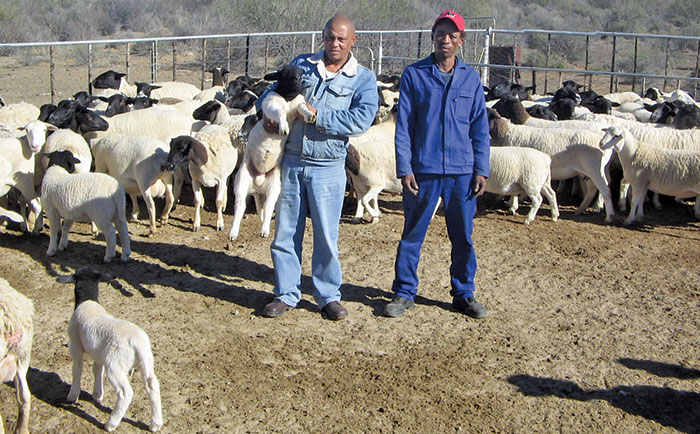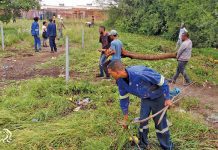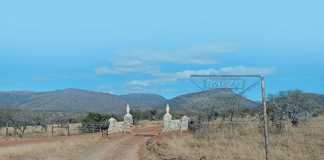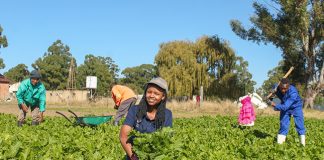
Photo: Gawie van Wyk
The Jagpan Vernootskap Boerdery (Jagpan) is a mentorship project set up in Northern Cape in 2007 by 56-year-old Gawie van Wyk, with four emerging farmers as partners – Patrick Sacco (53), Jan Moolman (59), Dirk Sacco (58) and Ismael Louw (29).
Gawie, a production adviser for the National Wool Growers Association, has been with the organisation since 1984 and has 26 years’ farming experience.
He set up Jagpan in his personal capacity and is assisted by his brother-in-law Jannie van Heerden (50), who is Farmwise Grains’ managing director. Gawie says the four farmers have come a long way in acquiring commercial sheep-farming skills they never had before.
Jagpan’s success has been proven over the last three years. In 2008, the land affairs department awarded Jagpan for best financial management among emerging farmers, and in February this year, Jagpan scored 99,3% for its slaughter lambs at the Carnarvon Agricultural Show.
In 2010 and again in 2011, the project won first prize in the South African Meat Industry Company (SAMIC’s) slaughter lamb competition in Vryburg. Jagpan also took first and second prize in SAMIC’s single carcass competition and second and third prize in the group of three lamb carcasses competition this year. “They’ve shown great commitment, and I’m really pleased with their progress,” says Gawie.
Getting started
Jagpan’s four farmers were selected from a group of emerging farmers in Carnarvon who leased land for grazing from the municipality. “The problem is these farmers never really get anywhere, because you can’t build a farming business with between five and 15 sheep on 40ha to 60ha. It’s not sustainable,” explains Gawie.
Three of the chosen farmers had never farmed commercially before. Patrick is a bank teller, Jan is a clerk in the Carnarvon municipality and Dirk is a private contractor in town. However, Ismael had worked for a farmer on a 10 500ha farm, which is situated between Carnarvon and Brandvlei (120km from Carnarvon).
The land affairs department bought this farm in 2007 for R4,725 million.
To develop a viable commercial flock, Jagpan applied to the state to run 800 Dorpers on this farm. Jagpan’s business plan was accepted, and the state agreed to allow the partners to lease the farm for a seven-year period at no cost, but with commitments to manage and maintain it.
The state contributed R80 000 for water tanks, troughs, ball valves and droppers, and agreed to buy 400 Dorper ewes for the emerging farmers. These ewes were then run with 400 Dorper ewes belonging to Gawie and Jannie. All 800 ewes are farmed as a unit with a 50% share of the profits going to the emerging farmers and 50% to Gawie and Jannie. “This way, their success is my success and their losses are my losses,” says Gawie.
According to their business plan, the emerging farmers must build up their own flock to 800 ewes within seven years. As this happens, Gawie and Jannie decrease their ewe numbers and their percentage of the profits accordingly. The four farmers already run 600 of their own Dorper ewes.
“By the end of the seven years, they’ll be self-sustaining,” says Gawie.
Respect & learning
Jagpan’s members signed a code of conduct in which they agreed to conditions such as honesty and commitment to the project. Dirk explains, “The code of conduct is part of our success because we have strong Christian values. The other part of our success is that it’s our project and our sheep, so we’re committed to looking after them and the veld.”
Jan adds, “We have an excellent partnership with a lot of mutual respect. We discuss all the farming issues and talk them out.”
To help them get on their feet, and because of the distance to the farm, Gawie and Jannie gave the emerging farmers a bakkie to use and they all share the fuel expenses.
“I like the fact that three of these farmers are older, because they’re responsible about their farming commitments, whereas many of the younger people aren’t,” says Gawie, who wasn’t concerned that they started out with little commercial farming experience. “They’re keen and intelligent. They all completed their matric and have further education and they’re continuing in their jobs while building up their sheep numbers.”
Ismael lives on the farm and does the daily work. At this stage there’s not enough profit to support all four emerging farmers, but the partnership jointly pays Ismael’s salary.
They’ve come a long way. “In the beginning the three town-based members would get lost on the farm and it was overwhelming for them,” says Gawie.
But they adjusted quickly and were keen to learn as he taught them everything about managing sheep – from grazing schedules, mating seasons and health programmes to handling sheep in the kraal and marketing the lambs.
“My aim is to give them the skills and confidence to make them independent. They now do most of the work themselves and report back to me,” he says.
“I believe in teaching people as much as you can and then letting them try on their own, including making mistakes and learning from them. I’m always there to advise. Many emerging farmers think it’s easy to farm and that all farmers are rich. This group now realises this isn’t the case and that you have to face drought, theft, problem animals and disease,” he says.
Patrick adds, “Our lambs are getting high prices, which is great, but we were also hard hit by Rift Valley fever.” Last year they lost 64 ewes.
Uncertain future
Obed Mvula, Northern Cape’s land affairs chief director, based in Kimberley, says government stopped selling farms to emerging farmers last year, one of the main reasons being that too many of these farms were repossessed.
So, with three years left of their lease, Jagpan’s farmers are now feeling insecure about their future, as they’ve put so much of themselves into the farm and want to buy the land before expanding further. In May this year they wrote to the land affairs department and Northern Cape’s MEC asking to buy the farm. So far they haven’t been successful with their application.
“We want them to look at how they can transfer ownership to us, because we need to invest in more infrastructure on the farm,” explains Dirk. “We don’t want to do this if the farm isn’t ours, because the municipality can rent it to someone else in three years’ time, and then we walk away with nothing.”
Patrick adds, “With ownership, we have security to go to the bank and apply for a loan to buy more stock. We’re not asking government to give us the land, we’re asking it to work out a realistic price for us and we’ll buy the farm.”
Mvula says the land affairs minister would consider selling land to emerging farmers in exceptional cases. The Jagpan farmers have since applied to the minister, but haven’t heard anything yet. “We’re now thinking of going to Kimberley to talk face to face with the people there,” says Jan.
“This farm means so much to us,” adds Dirk. “We don’t want to be rich, we just want our children and grandchildren to know what we’ve done for them.”













